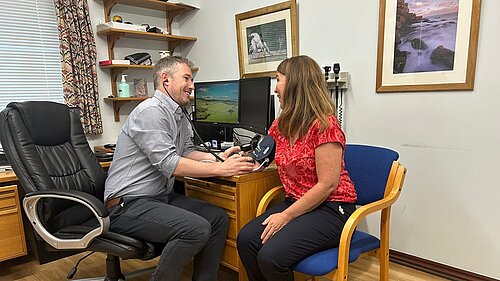The Family Doctor

The family doctor remains a much-loved part of our NHS. Since being elected – and even before – residents have raised concerns about delays in getting appointments, difficulties accessing services, and the need for more GPs to serve our growing - and aging - community.
To better understand these issues, I’ve spent recent months meeting with doctors, practice managers, and the organisations that support them. I recently shadowed a GP at Walford Mill Surgery in Wimborne to see the reality firsthand.
I want to thank Dr. Wright and all the patients who kindly allowed me to observe what were often deeply personal and distressing consultations. What I witnessed was high-quality, compassionate care. Despite a busy schedule, the GP took time to liaise with hospitals, arrange tests, write referrals, and fully support his patients.
Some residents contact me suggesting GPs should see more patients per day. But my experience shows that fewer, longer appointments often lead to better outcomes. Many patients presented with multiple or unrelated conditions, and early intervention can prevent more serious – and more costly – treatment later.
While the British Medical Association recommends 15-minute appointments, most surgeries only allow 10, trying to manage demand. I saw staff skilfully triage cases by phone and email, resolving many without appointments and helping patients avoid unnecessary hospital visits – even though they aren’t fully funded for that extra work.
I’ve raised concerns with NHS Dorset about underfunding. For example, GP surgeries are reimbursed for blood tests at just 25% of the actual cost. I also saw cancer follow-up investigations done in the surgery that, in other counties would be handled by hospitals – but Dorset’s “pathway” pushes the burden onto GPs to cut hospital costs, causing delays for patients.
Technology is used well in surgeries – prescriptions are sent directly to pharmacies – but GPs are still burdened by hospitals using paper systems, requiring them to re-prescribe post-discharge. I also heard support for empowering pharmacists to adjust prescriptions when brands are unavailable, recognising their expertise in medicines.
In Parliament, I’ve raised the outdated list of conditions eligible for free prescriptions – unchanged for 50 years – and the severe shortages in neurologists for patients with Parkinson’s, MS, epilepsy, and Alzheimer’s. These delays worsen outcomes and push more work onto GPs.
Long waiting lists mean patients often return several times as conditions deteriorate – time that could be used to help others if earlier treatment were available.
Encouragingly, I’ve heard of plans to expand surgeries and recruit more GPs. But the current funding model is complex, risky for GP partners, and riddled with arbitrary rules. I’ve raised this with NHS Dorset and written to the Minister asking when the next round of surgery funding will be allocated, so we can plan for new facilities in Mid Dorset and North Poole.
As a parent of four and regular NHS user, I understand public frustration. But I have confidence in our frontline medical professionals – GPs, dentists, pharmacists – who are doing all they can under immense pressure.
We must support them to stay in the NHS and help rebuild it. As a Liberal Democrat, I want everyone to have a named GP, support the training of more GPs using experts in our communities, ensure proper community infrastructure comes first when new housing is built, and shift to prevention wherever possible.
That can only happen if we invest in General Practice.
Vikki Slade MP